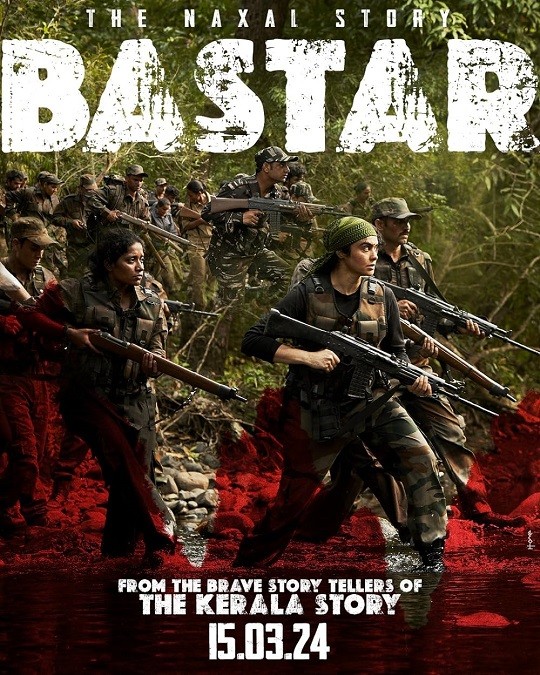Bastar: The Naxal Story
Introduction
You don’t need to be a genius to understand the pattern of the films releasing lately, and what they are as a lead up to(go ahead, decode this😂)! I had one leftover from the weekend and with that, I finished watching the new Hindi film Bastar – The Naxal Story which is now available in a theatre near you. I am usually quite upbeat for most films that I watch, be it in a theatre or otherwise. But somehow, Bastar fell in that category of films that I had to watch simply to carry out my duties as a film reviewer. There wasn’t an enthralling sense of excitement before venturing into the film wherein I had to literally drag myself to cover the film. It may subconsciously have had to do with the fact that the team of The Kerala Story was returning for their new film, and The Kerala Story, although a huge hit, did not resonate with me even from a filmmaking perspective. Thus, my expectations were low from Bastar – A Naxal Story even before its first reel played out, does it manage to spring a surprise, let’s find out.
Story & Screenplay
Based on true events, Bastar – A Naxal Story follows the story of an army officer who leads a mission to eradicate the Maoists responsible for the massacre of a military troop. The story here fails to leave an impact(and I promise, I did watch it with an open mind) even from a writing stand point and that had a lot to do with the conflict that it was trying to address. The Naxalite conflict is much more complex than it is made out to be, and while the argument presented here does hold ground, it may not paint the entire picture. Again, the story could have been a personalized one too if it chose to, something that I had mentioned for The Kerala Story too, but the moment you start painting the narrative with fixed ideologies as opposed to evenly balancing the narrative, you will more often than not falter. And should you still choose to do it, then fill it with so much detailing that it would document the case just like the makers did with the brilliant film Article 370 which should honestly be a case study. Unfortunately, the demarcation of black and white is quite distinct here wherein the screenplay of 125 minutes, fails to address the ‘grey’!
The drama here, much like the narrative structure of The Kerala Story opens with two separate timelines, with one strictly focused on the court case while the other traces the set of incidents transpiring on either side of the gruesome attack on the military that resulted in several deaths. I felt that this was a more structured opening(to the film’s credit) as opposed to The Kerala Story that had three timelines unfolding in parallel. So you are introduced to all the principal characters, and even before the conflict is established, I could see that most characters are just cardboard cutouts, coated in either of the two binary colours that do not evoke any kind of emotional sentiment in you. This applies even as a man, a relative of one of the characters is hacked to death in the most gruesome way possible by the leader of the Maoist group(who is given a look inspired by Che Guevara) because the former wished to build a school and a road for children in the village. This incident is quite shocking but the underlying conflict is just so weak that the impact of the drama is only reduced to the events of brutality shown onscreen, as opposed to a more rounded impact.
The proceedings lack the bite because the writers are satisfied with the conflict scratching the surface while never quite taking it deep. In between, there is a character talking about controlling the narrative through various mediums that included ‘Bollywood’, and that made me wonder if this film was a meta-reference for itself? Again, at no point was there any documentation of the claims that were simply rolled out whereas, films like these should ideally thrive on the detailing and documentation even from the stand point of the authorities(the year where the film set in is 2010).
As the drama unfolds further, it continues to lack coherence which was such a shame because the drama did show a little promise at the halfway mark with the entire sequence of events leading to the actual attack. But again, the emotions just don’t hit you because the stakes are quite low with respect to the characterization, wherein most characters are one-dimensional and true to their traits. The politics around the actual Naxalite movement is absolutely not touched upon and hence, there was a disconnect for me in a huge manner. The events leading up to the final act are quite abrupt and lack logic(how could a character sneak out of a car surrounded by Maoists, and escape?), while the final act is non-existential and far too simplistic and convenient. Overall, the screenplay needed some depth for it to work as opposed to just showcasing the shock factor in the narrative.
Dialogues, Music & Direction
The dialogues are loud and do not gel with the vibe of the theme that needed to be understated. The music is decent but the BGM is loud and dar too generic to evoke any sort of a sentiment towards the drama or its characters. The cinematography captures the brutality in certain sequences quite efficiently and that is a positive in the technical department. The editing is decent here although the second half lacks coherence in a very big way. Director Sudipto Sen has a better outing as compared to The Kerala Story in terms of craft but it still wasn’t quite upto the mark. The focus needed to be on the characterization and the complex politics surrounding the Naxal movement, but to over simplify things even in the directorial space wasn’t ideal. And as a result, the overall impact of the drama is reduced.
Performances
The performances are a mixed bag here and some of it had also to do with the way the characters were written. Kishore Kadam and Shilpa Shukla are excellent in their respective roles despite a limited screen time. Yashpal Sharma starts off on a ‘louder’ note but finds his footing after a while. Raima Sen is decent as well but her character was way too similar to the one that she portrayed in The Vaccine War. Anangsha Biswas is good but again her characterization made her character one-dimensional. Gopal Singh, Vikas Shukla and Naman Jain are alright. Vijay Krishna does bring intensity to his role but again the script never touches upon the origin of his character or his motivations. Indira Tiwari was the pick of the actors for me who was brilliant even with her emotional outcry as much for her motivation and she was terrific to witness. Adah Sharma is once again inconsistent with her character, good in a few places but very stiff in others. Because it was her character driving the narrative, you needed a top notch performance which wasn’t the case here.
Conclusion
Bastar – The Naxal Story is far too involved in showcasing the ‘black’ and ‘white’ parts of the drama without addressing the ‘grey’ which oversimplifies the film and reduces its overall impact. Available in a theatre near you.




